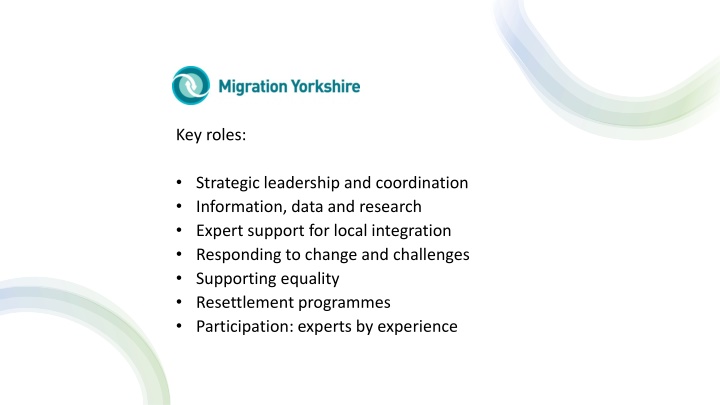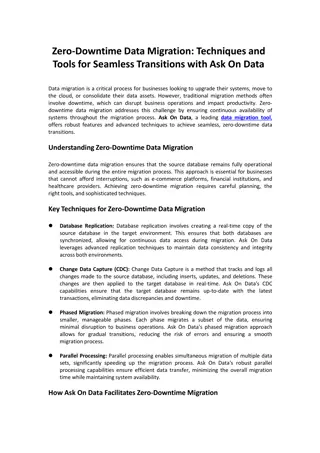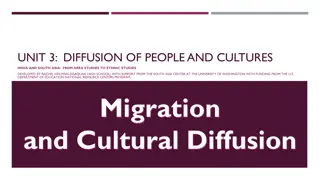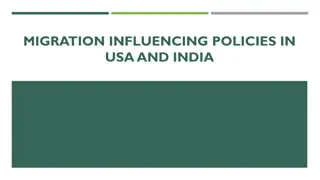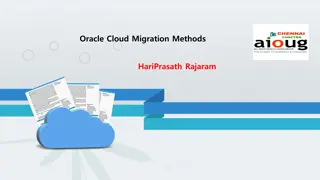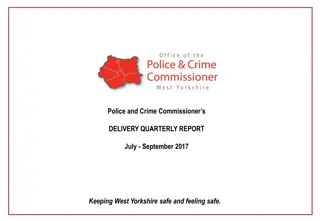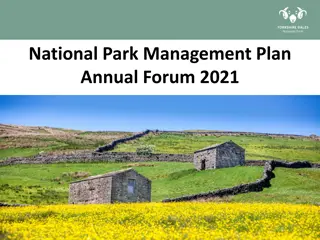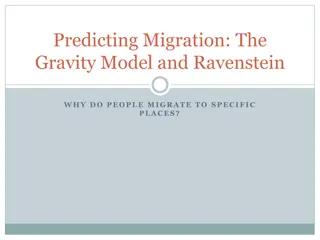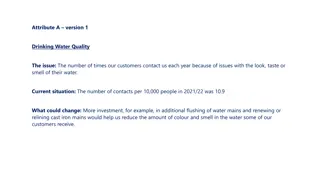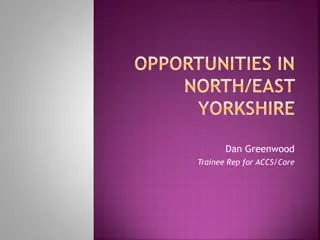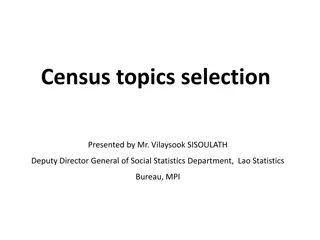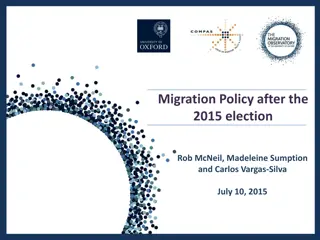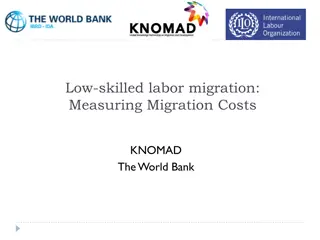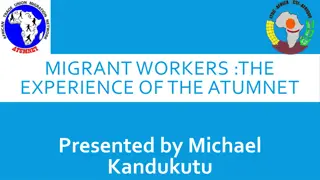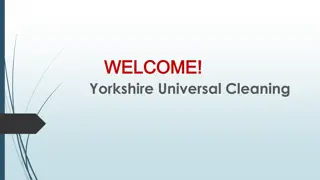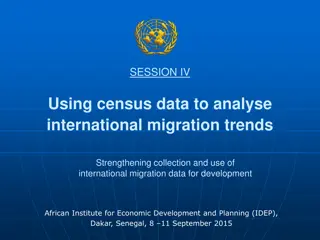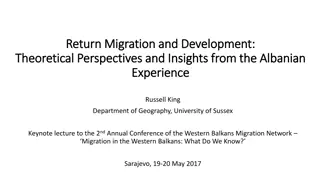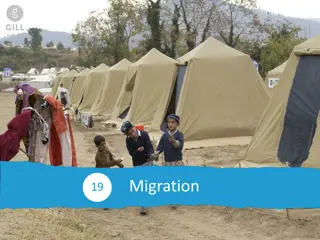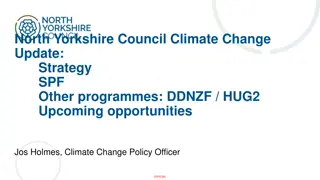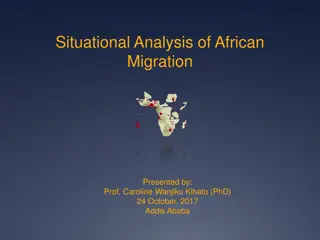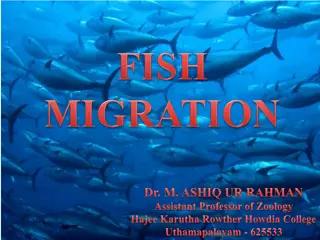North Yorkshire Migration Programs and Initiatives
North Yorkshire is actively involved in various migration programs, including resettlement of refugees, supporting asylum seekers, and processing EU settlement scheme applications. The region has welcomed refugees from Syria, Iraq, and Afghanistan, as well as supporting unaccompanied children. The upcoming census in 2022 will provide more detailed information on the breakdown of nationalities in North Yorkshire.
Download Presentation

Please find below an Image/Link to download the presentation.
The content on the website is provided AS IS for your information and personal use only. It may not be sold, licensed, or shared on other websites without obtaining consent from the author.If you encounter any issues during the download, it is possible that the publisher has removed the file from their server.
You are allowed to download the files provided on this website for personal or commercial use, subject to the condition that they are used lawfully. All files are the property of their respective owners.
The content on the website is provided AS IS for your information and personal use only. It may not be sold, licensed, or shared on other websites without obtaining consent from the author.
E N D
Presentation Transcript
Key roles: Strategic leadership and coordination Information, data and research Expert support for local integration Responding to change and challenges Supporting equality Resettlement programmes Participation: experts by experience
Some words that matter. Some words that matter. Migrant worker: A person who moves to a new country to find work International Student: A person who is studying in another country Undocumented migrant: A person who does not have permission from the Home Office to be in the UK EU Settled Status: A status EU citizens in the country by Dec 2020 could apply for, to continue to live, work and study in the UK on an indefinite basis Family Joiner: A person who been given permission to join a family member in another country
Some words that matter. Some words that matter. Asylum seeker. A person who has applied for protection from persecution under the UN Convention and is awaiting a decision from the Home Office on this application. Refugee: A person given permission to stay in the UK as a result of a process which began with a claim and/or assessment for protection under the UN Convention 1951 A person who owing to a well-founded fear of being persecuted for reasons of race, religion, nationality, membership of a particular social group or political opinion, is outside the country of his nationality and is unable or, owing to such fear, is unwilling to avail himself of the protection of that country; or who, not having a nationality and being outside the country of his former habitual residence as a result of such events, is unable or, owing to such fear, is unwilling to return to it." *Refugee responses have led to other protected status'.
Migration in North Yorkshire 55 refugees through the resettlement programme in the last quarter, 388 since March 2014 (Syrian, Iraqi, Afghan etc) 49 asylum seekers being supported awaiting a decision supported under Section 95 and Section 4 (end September) 23 unaccompanied children (since last annual record) 218600 EU settlement scheme applications (35 applications per 1000 people in NY) Ukraine Family Scheme, Homes for Ukraine (1370 arrived) Coming soon: census information 2022: breakdown of nationality
Migration in North Yorkshire Hong Kong British National (Overseas) Welcome Programme Ukrainian schemes Resettlement Dispersal Points based system
What do these status' mean for volunteering? Lots of people with the will and skill to contribute and connect in our communities Some simplicity All can volunteer For people seeking asylum good volunteering can be transformative and protective All newcomers may encounter or be impacted by formal and informal volunteers Different routes, reasons and rights, supports and needs, leading to different possibilities for commitment to volunteering. Flexibility is key. Some complexity Difference between volunteer work and volunteering is important for protecting people's legal security and any benefits they might receive
Some challenges for people volunteering Access to information and misinformation Barriers in the structures, systems and culture of volunteering Different experiences, needs, pressures Discrimination (or fear of it) code switching Previous experience and perceptions of volunteering (self or community) Choosing between migrant sector volunteering / generic volunteering Accessibility issues (e.g. language, 1 shot chances, commitment, geography, transport, health and conditions. cost) Changes to what was consented to / expected Trauma a need for psychological, physical and legal safety. DBS, fingerprinting and vetting, especially ID issues / references / issues with trust
Some facts on DBS Anyone can apply for a DBS See guidance People do not have to have a UK address history, or a complete address history See guidance You do not need a certificate of good conduct to get a DBS international police checks international police checks If people do not have the right paperwork to prove their ID they can go through the "fingerprint route" at a police station. A chaperone may help. The acceptable paperwork is updated often acceptable paperwork If people cannot meet requirements, talk with someone with the power to risk assess. They may be able to change a role, or to make use of a "signed declaration", or "sworn oath" as an alternative. DBS and police checking is only one limited way to keep people safe. If someone committed a crime in another country, that is not a crime here, this will not show up. If someone was detained for immigration purposes this is not the same as having been imprisoned. Update service Make sure people register with the Update service in time. DBS and vetting can be traumatic. You can process DBS in trauma informed way and prevent harm.
Some challenges for people accessing Some challenges for people accessing volunteer support volunteer support Difficulty in giving feedback unhelpful volunteer and migrant narratives Impact of trauma (own or volunteers) Difficulty in being heard and having knowledge/voice respected Inconsistency and unreliability Relationship issues / separation and loss Lack of understanding of diversity and complexity of experiences and situations Missed opportunities where the response is not coordinated Missed opportunities where the response is not coordinated
Intro to migration training (on request) Intercultural communications training for volunteers and hosts Training on DBS, fingerprinting and vetting (DBS/MY) tbc Coming soon Coming soon Resources on Trauma informed volunteering and participation Training on specific issues in N Yorks. Invite and roll out Translated resource explaining volunteering in the UK, planning for volunteering, and vetting and checks (including DBS) and participation Resource on research available and information we need Research
Migration Yorkshire Contacts: If you have any enquiry about anything migration related in the region, you are welcome to contact: admin@migrationyorkshire.org.uk data@migrationyorkshire.org.uk Vicky Ledwidge, Integration & Partnerships Officer Information Statistics Dashboards, Hong Kong Hub, Ukraine Hub, Research, Welcoming young refugees, Migration Yorkshire, Regional ESOL Provision Resource, Qualified Immigration Advisors, Permission to work and volunteer for Asylum Seekers and Refugees DBS Contact DBS Regional Contact: Rebecca Bool DBS information Understanding Refugee & Asylum Seeker Mental Health Free online Course. By Solace
